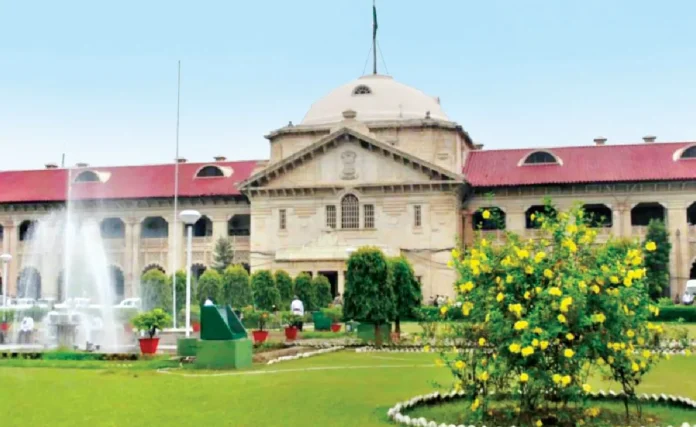The Allahabad High Court has allowed a petitioner, Ankit Agrawal, residing in the United States of America, to appear virtually in divorce proceedings under Section 13-B of the Hindu Marriage Act, 1955.
A Single Bench of Justice Neeraj Tiwari passed this order while hearing a petition filed by Ankit Agrawal.
The petition has been filed seeking following reliefs:-
” Issue any order or direction, setting aside the order dated 16 of May 2024 passed by the Principal Judge, Family Court, Firozabad, in (Ankit Agrawal vs Monika Agrawal) under Section 13-B of Hindu Marriage Act.
Issue any order or direction upon the Court of the Principal Judge, Family Court, Firozabad, to exempt the petitioner’s physical presence in the proceedings under section 13B of the Hindu Marriage Act, which is registered as (Ankit Agrawal vs Monika Agrawal) and the petitioner may be allowed to participate in the further proceedings, including any mediation conducted by the court, either virtually or through its special power of attorney holder.”
The facts of the case are that marriage of the petitioner and the respondent was solemnized on 25.07.2015 as per Hindu Rites and Rituals. Till 2018, the petitioner was working as Computer Engineer in Noida and subsequently, petitioner along with respondent shifted to the USA.
In due course of time, some differences took place between the parties leading to initiation of criminal proceeding as well as proceeding under the provisions of Domestic Violence Act against the petitioner.
Lastly, in order to give logical conclusions to the aforesaid proceedings, a memorandum of understanding/settlement dated 06.05.2023 was entered between the petitioner, through his special power of attorney holder and the respondent wherein it was decided between the parties to file a petition under section 13B of the Hindu Marriage Act before family court at Firozabad for divorce by mutual consent.
It was also resolved between the parties that respondent shall not pursue the criminal proceeding against the petitioner and his family members.
Consequently, a petition under Section 13B of Hindu Marriage Act was filed by the petitioner through its special power of attorney holder before the family court at Firozabad on 06.05.2023.
Principal Judge, Family Court, Firozabad has decided to proceed with mediation in the matter, but as the petitioner was residing in the USA, he could not be personally present to file the petition.
However petitioner ensured his presence through virtual mode where he verified the identity of his wife and his special power of attorney holder.
The petitioner was not in a position to come back to India in order to pursue his petition as he is currently employed in a company based in the USA, therefore, he has preferred to move an application dated 09.05.2023. After considering the said application, Principal Judge, Family Court, Firozabad has rejected the same by the order dated 16.05.2024.
Counsel for the petitioner submitted that similar dispute arising out of Section 13-B of Hindu Marriage Act was came up before the Apex Court in the matter of Amardeep Singh vs Harveen Kaur, in which Apex Court has taken a clear cut view that Court can also use the medium of video conferencing and also permit genuine representation of the parties through close relations such as parents or siblings.
He next submitted that in light of judgment given by the Apex Court, rejection of application of petitioner is bad and impugned order dated 16.05.2024 is liable to be set aside.
The Court observed that,
There is no dispute on the point that during the course of time, there is lot of technological development and there are so many mode of virtual appearance i.e. skype, video calling etc., therefore, application for appearance before the Court through virtual mode cannot be rejected.
This issue was also before the Court in the matter of Shilpa Chaudhary vs Principal Judge and Ors; 2016 (4) ADJ 262.
The Apex Court in the matter of Amardeep Singh (Supra) has also considered the issue of video conferencing.
Similar controversy was also came up before the High Court of Karnataka in the matter of Aditya Jagannath and Ors; in which facts are also identical to the case.
Now coming to the case. Facts of the case are squarely similar to the facts of the judgments cited above, therefore, the Court has no reason to have a different opinion. It is required on the part of Court to permit the petitioner to appear through virtual mode as prayed, the Court said while allowing the petition.
“Therefore, under such facts of the case as well as law laid down by the Courts, the order dated 16.05.2024 is bad and hereby set aside.
The Principal Judge, Family Court, Firozabad is directed to permit the petitioner to appear through video conferencing or any other electronic mode and be allowed to participate in further proceeding.
It is open for the Principal Judge, Family Court, Firozabad to verify the identity of petitioner by the respondent while he is appearing through electronic mode,” the order reads.


